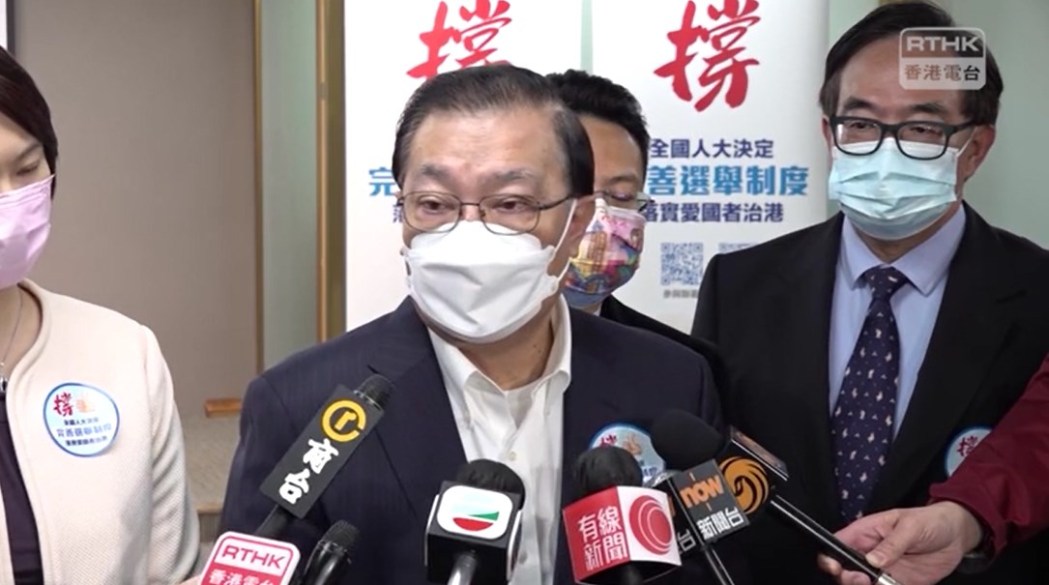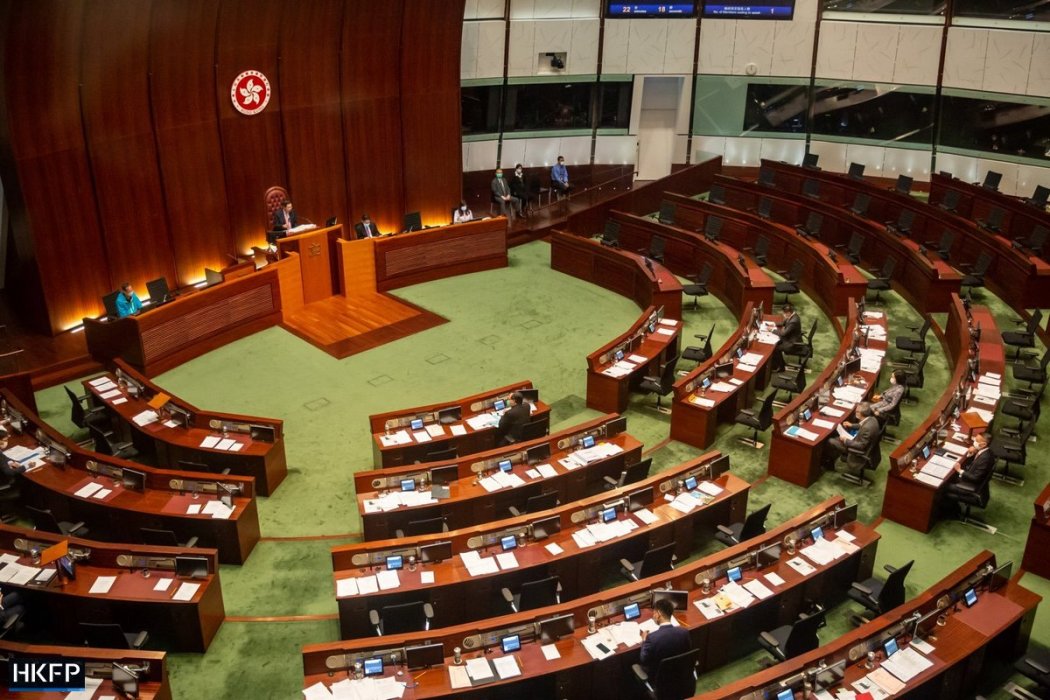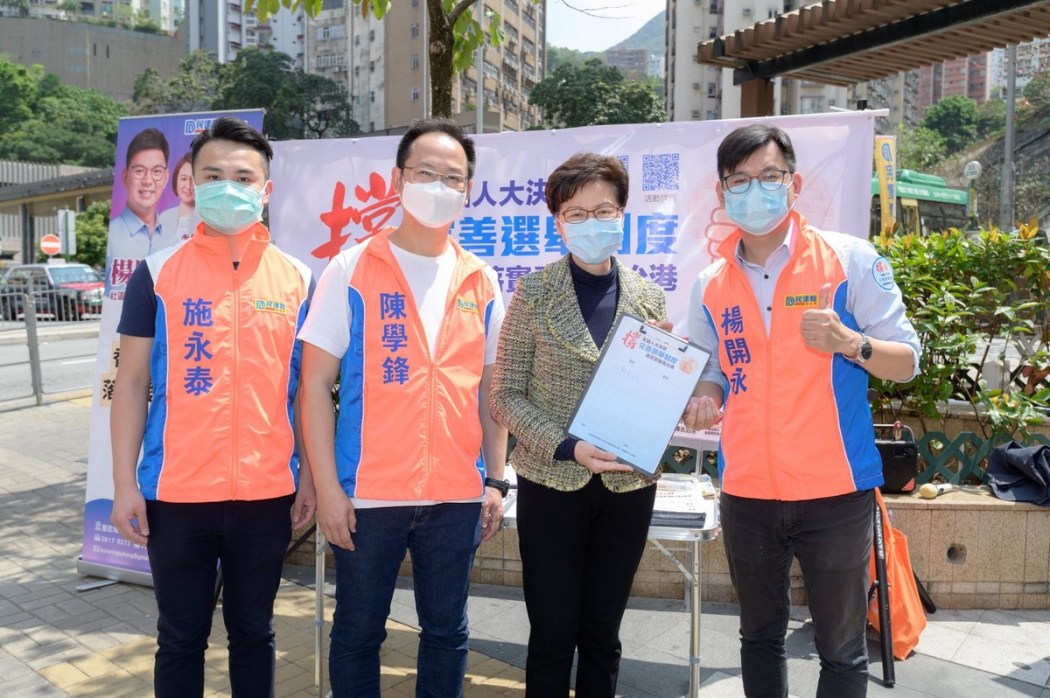A pro-Beijing group in Hong Kong claims it has gathered more than 2.38 million signatures in support of the looming electoral overhaul which aims to ensure that only “patriots” rule the city.
The Sign For HK 2021 campaign – led by Beijing loyalist Tam Yiu-chung – announced on Sunday that more than 1.17 million people signed an online petition and it had collected over 1.21 million signatures on the street since March 11, when China’s legislature voted to approve the changes.

The campaign, which is backed by pro-establishment lawmakers including Starry Lee and Regina Ip, said the 2,385,732 signatures showed broad support for Beijing’s decision. The organisers said citizens wanted improvements to the electoral system to let Hong Kong “get back on the right track.”
Organisers said they excluded duplicates and signatures from a non-local IP address.
The 11-day campaign saw high-ranking officials such as Chief Executive Carrie Lam, Secretary for Justice Teresa Cheng and Secretary for Security John Lee contributing their signatures. Tam said people who signed were all adults but some photos on the group’s Facebook page showed children penning their names.

“This signature campaign became a platform for the general public to express their voices. No matter what age and occupation, citizens actively participated and expressed support for improving the electoral system,” the group wrote on Facebook.
‘I think they are just lying’
Chung Kim-wah, deputy chief of the Hong Kong Public Opinion Research Institute (PORI), told HKFP on Monday that he was skeptical about the authenticity of the signatures. He said it was “impossible” to get over 2.38 million signatures in such a short time and it would take longer for the organisers to screen out the duplicates.
The pollster said the he did not see any mechanism adopted by the organisers to ensure the signatures were valid, such as checking people’s identification documents at the street booths. He accused Tam and other leaders of the campaign as “faking” the signatures.
“I think they are just lying,” he said.
Chung added it was “quite impossible” for signature campaigns to be completely accurate, saying they cannot reflect public opinion accurately: “It is a fact that [signature campaigns] won’t be an accurate way to reflect public opinion, but it is meaningful for mobilisation and promotion to a certain extent,” he said.

Joseph Chan, an emeritus professor at the Chinese University’s School of Journalism and Communication, also challenged the representativeness of the signature campaign. The consultant for the Centre for Communication and Public Opinion Survey told HKFP that the campaign could neither claim statistical representativeness nor majority support, because it was not based on random sampling.
Chan said that the self-selecting nature of signature campaigns may damage representativeness. He also raised doubts over the credibility of the organisers, saying they were “not known for their rigor in the solicitation of signatures.”
The public opinion scholar added that previous polls and elections showed the majority of voters and citizens were in support of the pro-democracy camp: “One therefore does not expect the population to have swung in favour of a program that has in effect short-circuited democratisation in Hong Kong. Any claims of majority support require scientific polls.”
Electoral overhaul
The changes were approved by the National People’s Congress without any prior public consultation in Hong Kong.
A new “review committee” will vet the qualifications of candidates in various elections. The number of directly-elected seats which currently make up half the Legislative Council (LegCo) will be reduced, while the pro-establishment Election Committee which selects the chief executive will be expanded from 1,200 to 1,500 members.
The committee will have new powers to nominate legislative election hopefuls and even to directly appoint some LegCo members.
The Hong Kong government said the overhaul would ensure the city’s stability and prosperity following months of protest in 2019. But the changes also prompted strong international condemnation, as they make it near-impossible for pro-democracy candidates to stand.

Last week, several senior Chinese officials met over 1,000 people in a closed-door consultation about the overhaul. Deputy Director of the Hong Kong and Macao Affairs Office Zhang Xiaoming claimed pan-democrats attended the meetings, but the Democratic Party, Civic Party and Labour Party all told HKFP that their members were not invited.
Hong Kong’s leader Lam earlier said the government would hear the views of different sectors, but there would not be an extensive public consultation owing to a shortage of time.
Support HKFP | Policies & Ethics | Error/typo? | Contact Us | Newsletter | Transparency & Annual Report | Apps
Help safeguard press freedom & keep HKFP free for all readers by supporting our team

LATEST FROM HKFP
HKFP has an impartial stance, transparent funding, and balanced coverage guided by an Ethics Code and Corrections Policy.
Support press freedom & help us surpass 1,000 monthly Patrons: 100% independent, governed by an ethics code & not-for-profit.










